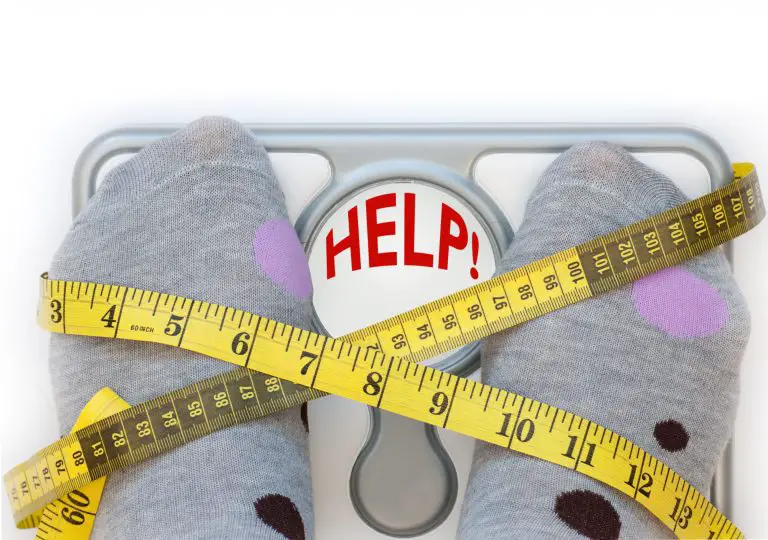
Page Contents
When you are taking a hair loss supplement to help with your hair growth, there is a good chance that it is because you care about how you look. Therefore, a hair loss supplement that lets you have hair regrowth while also causing you to gain weight will partially defeat your purpose.
That is besides the negative health effects of weight gain, which can actually negatively affect your hair as well. In extreme cases, these negative effects of your weight gain might be enough to effectively counteract however much the hair loss supplement is helping with your hair growth.
Basically, a hair supplement that causes weight gain can put itself in a stalemate where, even if it started helping your hair regrowth, it isn’t able to be any more help at all. Therefore, the accusation that a hair growth supplement causes weight gain is a very serious one to look at.
So Does Nutrafol Cause Weight Gain?
For the most part, Nutrafol doesn’t cause weight gain. Many people use Nutrafol for years with no effect on their weight whatsoever and amazing results for their hair. So, Nutrafol affecting your weight is not something that people wanting to try it need to worry about that much.
That said, there is the slight possibility that Nutrafol supplements can affect your weight. Looking through Nutrafol review articles and comments that people have left, there is the occasional mention of Nutrafol affecting you here. It is just how Nutrafol affects your weight that there is a lot of debate about.
Looking through the many Nutrafol Woman review comments on the product on Amazon, I saw exactly two people saying that Nutrafol caused them to gain weight. True, I didn’t look at the other Nutrafol supplement products.
However, I decided that one of Nutrafol’s core products was a good sample of what I could expect from the others. Considering there are hundreds of reviews there, only two reviews mentioning this is a very tiny amount of the people who use Nutrafol. Keep in mind not everyone who uses it will leave a review.
Out of these two reviews, one admitted that she had also started another product at the same time. Therefore, she couldn’t guarantee which one was the cause. The other was very confident that Nutrafol was the culprit, even stating that the weight started coming back off when she stopped taking it.
However, one or two Nutrafol review articles also have people stating that Nutrafol caused weight loss for them.
Related Reading
- Vegamour Vs. Rogaine
- Nutrafol vs Viviscal: Which is Better for Hair Loss?
- Negative Side Effects Of Viviscal
So Can Nutrafol Cause Weight Gain?
Obviously, the answer as to whether or not Nutrafol can cause weight gain is, yes, it can. However, weight gain is both one of the least commonly reported side effects as well as being contradicted by an equal number of people saying it has helped them with weight loss.
However, you should note that these two things are not mutually exclusive of each other. In other words, the Nutrafol supplement is perfectly capable of causing weight loss in one person while simultaneously causing weight gain in someone else.
Nutrafol doesn’t mention that their product affects your weight at all, instead telling about how it can help with hair thinning from many of the common causes. The fact is, though, that Nutrafol affects everyone slightly differently.
A hundred people can take the same product and get many different results. Most people are fairly aware of this. It might be their metabolism is faster or slower. Perhaps it is something in their diet that affects the Nutrafol supplement, or maybe it is something completely unaccounted for.
In light of the number of different ingredients that Nutrafol has, there are bound to be different results. While the Nutrafol ingredients are all there to help you get healthy hair growth, one of the natural ingredients might affect you more than the others.
So, let’s review the Nutrafol supplement’s natural ingredients to see what can affect you either one way or another. First, we’ll see if any Nutrafol ingredients can be directly linked to weight gain, then we’ll look at the opposite.
Keep in mind, some vitamins will actually be on both lists, which isn’t exactly helpful. Since the different Nutrafol supplements have slightly different ingredients, I’ll only look at the ones they almost all share. As fair warning, you will find more than one Nutrafol ingredient on both lists.
The Ingredients That Can Cause Weight Gain

On the top of the Nutrafol supplement label is Vitamin A. This vitamin goes into providing energy for cell growth. When it isn’t needed for that, Vitamin A often turns into fat cells. The amount of Vitamin A in the Nutrafol supplements is over a day’s dose.
The exception is the Nutrafol Postpartum supplement, which has much less Vitamin A. Considering you are highly likely to be trying to get rid of weight after having a baby, this makes perfect sense.
Vitamin D is another Vitamin that can potentially cause you to gain weight. This effect when taking this vitamin is very rare, though, as Vitamin D actually helps regulate your weight. Usually, any weight increase from this is in your bones, as Vitamin D helps increase your calcium, making your bones stronger.
Zinc is another ingredient in Nutrafol that is a slightly confusing one. Supposedly, though, making sure that you get plenty of zinc can help you gain weight. However, it was implied that this was more if you struggled to pat on the right amount of weight, not referring to gaining more weight than wanted.
As for the saw palmetto and ashwagandha, both of these can supposedly cause weight gain. I saw an equal amount of sites that said the ashwagandha caused weight loss as said it caused weight gain. However, only one or two places said saw palmetto caused weight gain.
Both of these hair loss plants are in all but one of the core Nutrafol supplements, this one being the Nutrafol Postpartum.
The Ingredients That Can Cause Weight Loss
While Vitamin A can cause weight gain, it is also one of the vitamins that is occasionally used to help with weight loss. This is usually in the case of thyroid problems, which Vitamin A can help with. However, it can also help regulate hormones a little, which is another way it might help here.
Though Vitamin C is sometimes also put on both lists, it belongs more on this list. This is because natural forms of Vitamin C do help with weight loss. It is primarily the formulated types of this vitamin that can potentially cause weight gain.
Fortunately, almost all the Vitamin C in Nutrafol is made from the Camu Camu plant. The exception is the Nutrafol Womens Balance, which had Vitamin C formulated from ascorbic acid. Why that Nutrafol supplement is different, I don’t know.
The marine collagen in all the Nutrafol core supplements can certainly help you lose weight. This one, like all other types of collagen, helps increase your satiety, making you feel nice and full without having to eat as much. Since you take Nutrafol with meals twice a day, that is two of three meals that might not need to be as big.
Almost the opposite of that is zinc, which is yet another ingredient to go on both lists. A lack of zinc can supposedly keep you underweight, prevent you from gaining weight, and give you less of an appetite. At the same time, getting the zinc you need can also help you with weight loss.
So, there’s a bit of seeming contradiction there. The next contradiction is that, as mentioned, both saw palmetto and ashwagandha can potentially help with weight loss. How either of these work for that, however, is something not easily found.

Why Weight Gain Can Be Such A Big Deal
Weight gain, whether it is caused by a hair supplement or something else, can be a very serious thing. Sure, a few added pounds probably won’t affect you, and they may not even be noticeable. However, if you keep gaining weight and can’t get it to come off, then it can be a very big deal.
The more common dangers of being overweight are pretty well-known. These are heart problems, high blood pressure, diabetes, arthritis, and breathing problems. Slightly less common are things like gout, gallbladder problems, an increased risk of having a stroke, and other things.
Moving around becomes harder, which makes exercising to help your health almost impossible. With your lungs having a hard time, any type of respiratory infection is going to be a much bigger problem as well. In fact, one medical site like Mayo Clinic has overweight people in the high-risk category for COVID.
At the CDC website, it outright says at the top of their list that people who are overweight are at increased risk of: “All causes of death (mortality).” So, besides being very blunt, the CDC apparently feels the need to cover all the potential effects right off the bat.
Further down on their list, they also say that excess weight increases your chances of many types of cancer. Cancer is definitely considered to be one of the most serious medical conditions you can get. It is right up there with heart problems as one of the leading causes of death.
In short, staying a healthy weight is excessively important, but there is one particular aspect of weight gain that I feel is worth a closer look at. This is how your weight can impact your hair growth and can cause hair shedding.
How Weight Can Affect Your Hair
Your weight can actually affect your hair in a lot of different ways. For starters, it decreases your circulation, which practically everyone knows is bad for your hair health. Less circulation will both make for fewer nutrients getting absorbed as well as less of the absorbed nutrients making it to your hair.
Next, medical conditions, such as most things with your heart, blood pressure, etc., will require medication. The more of these conditions you have, and the worse they are, the more medications you’ll end up taking. In turn, the more at risk of side effects you’ll be.
Some side effects of medications are hair thinning, and this would be on top of the hair thinning caused by the condition itself. Then again, some of the side effects might indirectly lead to added hair fall. Stomach problems of various sorts are just one example of something that would do that.
Also, little-known is the fact that weight gain can mess around with your hormones. Fluctuating or imbalanced hormones are something that can directly cause hair loss. Just think about women going through menopause or who have just had a baby.
Both groups of women commonly have hair shedding to some degree primarily because their hormones are rebalancing themselves. After all, that is why Nutrafol developed their Nutrafol postpartum.
Finally, if excess weight does give you cancer, you are all but guaranteed to have hair loss. No dietary supplement in the world can save your hair if you have to go through chemo for a length of time. These effects of weight gain are just a few of the reasons to avoid it if you are aiming for hair regrowth.
Final Thoughts
As you’ve seen, Nutrafol can cause weight gain. Nutrafol can also cause weight loss, and there is no guarantee which of these will be the case for you. This is why knowing what you weigh as well as only making one life change at a time is so important.
If you change your diet at the same time you start a supplement like Nutrafol, or start taking two different supplements at the same time, you aren’t going to know which it is that is affecting your weight.
It can potentially be very tempting to make a lot of life changes at once, making a clean sweep of bad habits. However, finding that your changes affect you in some way, such as causing weight gain, is far more troublesome.
So, if you decide that Nutrafol is the right supplement for you, carefully consider when to start it. Starting it around Thanksgiving when you are likely to pick up a few pounds is just as inadvisable as starting two hair loss supplements at once.






